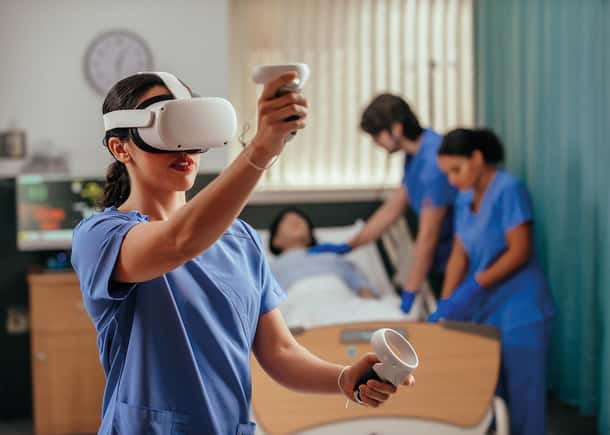How Might Technology Help Elevate both Access and Quality in Healthcare?
Michael Sautter
Chief Learning Officer at Laerdal Medical


The challenges in healthcare are multifaceted, encompassing issues of access and quality. While significant strides have been made in improving access to healthcare services, particularly in underserved regions, a recent Lancet Commission report highlights a critical shift: the prevalence of poor-quality healthcare now poses a more significant threat than mere lack of access. Therefore, addressing both access and quality is paramount.
Michael Sautter, Chief Learning Officer at Laerdal Medical
Central to this endeavor are three fundamental elements: People, Systems, and Technology.
At the end of the day, and for the foreseeable future, healthcare is both human-centered and human-delivered. Humans are not machines. Neither patients nor their caretakers can or should be viewed through a mechanistic lens. Nor should healthcare be discussed with a vocabulary inherited from the Industrial Revolution. As sentient thinking beings, we bring our whole selves, our bodies, our values, and our thinking to every encounter with others. The same applies to the self-talk we all are continuously engaged in. The objectivity of science-based best practices related to a certain condition or diagnosis is always met at the gate by the subjective lived experience of any given healthcare provider.
With regard to Systems, it seems timely to re-state the famous quote from W. Edwards Deming: "Every system is perfectly designed to get the results it gets." My takeaway from Deming is less about finger-pointing at a potential negative, almost mechanical causality between input and outcomes. Rather to the contrary, it points to a very positive worldview, stating that we are the master designers of our own future, including the access and quality of healthcare.
For a national healthcare system to be able to deliver both the access and the quality desired, innovation must come at both the healthcare education institutions as well as the many places healthcare is provided. Strong, standardized curricula supported by educational methodologies like Competency-Based Education secure the influx of measurably competent and confident healthcare providers. Furthermore, empowering those closest to the problems in our healthcare institutions to be the ones to improve them is perhaps the best way to include them as change agents in implementing what has proven to work locally at their own facility.
We live in a time when technology is everywhere. With particular relevance for healthcare, we sense that technology can help us address both questions of quantity and quality. Understandingly enough, our internal jury deciding on whether to fight or flight may still be out. The generative AI revolution is upon us, and depending on each individual's inclinations, we may see it as either scary or fantastic. If we are able to suppress our reptile response for a while, we should be able to ask the critical questions that beg for answers. How might technology help us achieve our goals of both access to and quality of healthcare? How might technology help us improve the way our healthcare systems operate? And perhaps even questions related more directly to healthcare personnel and the patients they serve, like how can I, as a doctor, nurse or midwife, use this technology to support me in my lifelong learning and the work I do?
An optimistic view states that technology, in general, and generative artificial intelligence, specifically, holds the potential to give every healthcare professional a superpower in their work. Examples span from co-piloting the diagnosing process (like skin-cancer recognition), improving flow and speed of recovery during a hospital stay, all the way through to how healthcare workers within their hyper-specialised domains can work better together to benefit both their own well-being and, of course, improve patient outcomes. An upcoming movie, "The Pitch", speaks to how technology evangelists and people with deep know-how are offering their insights and competence to healthcare to improve patient safety.

The challenge for an already overloaded healthcare system is how to make itself approachable for collaboration with those who have the necessary know-how. But the challenge also goes to us evangelists and technologists: How well are we able to articulate and demonstrate the actual value of what we are proposing to those who are wearing the shoes? Simply put, we must clearly demonstrate how we solve the problems of healthcare providers and systems, not simply add to their already heavy burden.